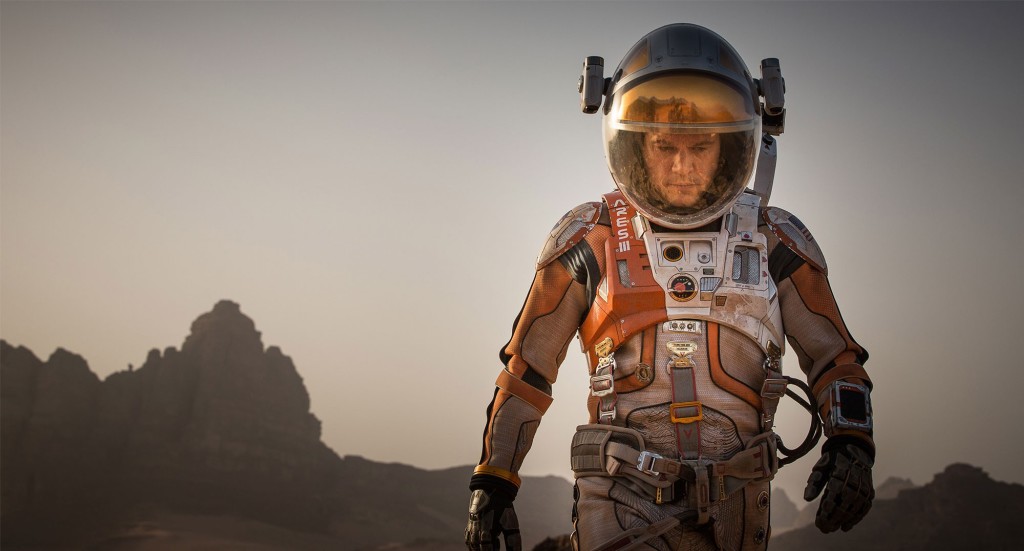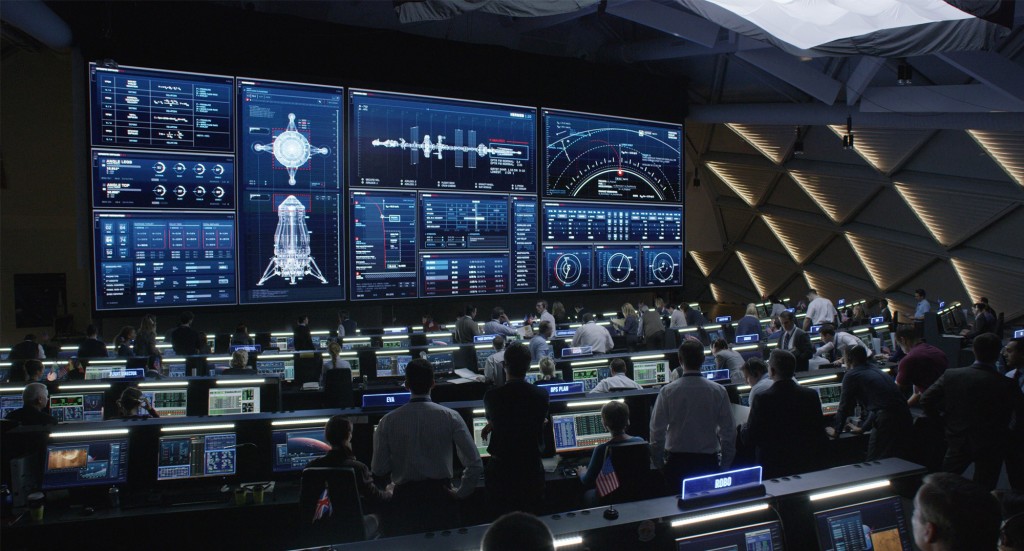 I’m usually incredibly wary about getting hyped up for a movie—the final product so rarely lives up to the sum of its parts. But in the case of The Martian, this fall’s obligatory space thriller, the parts were so unimpeachable that I made an exception. Matt Damon. Ridley Scott. Drew Goddard, the writer behind the second-best slew of LOST episodes, adapting widely-acclaimed source material. When it scored a 93% tomatometer, my hopes reached near-record heights. Still, unbelievably, I walked out of the auditorium feeling completely satisfied. The movie delivered for me on every level, with strong, evocative visuals, particularly of the vast Martian desert; generally excellent acting, with shout-outs to Damon and Chiwetel Ejiofor of 12 Years a Slave; and a superbly told story. It’s the kind of movie that reminds me that the mainstream Hollywood formula isn’t at all bad on principle. Indeed, as I started thinking about what to write for this review on the way back from the theater, I worried I wouldn’t find much to say. The Martian was, it seemed at first, exactly the testament to conventional storytelling wisdom I’d been expecting and hoping for.
I’m usually incredibly wary about getting hyped up for a movie—the final product so rarely lives up to the sum of its parts. But in the case of The Martian, this fall’s obligatory space thriller, the parts were so unimpeachable that I made an exception. Matt Damon. Ridley Scott. Drew Goddard, the writer behind the second-best slew of LOST episodes, adapting widely-acclaimed source material. When it scored a 93% tomatometer, my hopes reached near-record heights. Still, unbelievably, I walked out of the auditorium feeling completely satisfied. The movie delivered for me on every level, with strong, evocative visuals, particularly of the vast Martian desert; generally excellent acting, with shout-outs to Damon and Chiwetel Ejiofor of 12 Years a Slave; and a superbly told story. It’s the kind of movie that reminds me that the mainstream Hollywood formula isn’t at all bad on principle. Indeed, as I started thinking about what to write for this review on the way back from the theater, I worried I wouldn’t find much to say. The Martian was, it seemed at first, exactly the testament to conventional storytelling wisdom I’d been expecting and hoping for.
Upon reflection, however, “conventional” is the last term I would use to describe this movie.
In terms of its technical aspects, the film plays like a typical Hollywood power punch from start to finish. The wide-angle shots showing off impressive CGI landscapes, Harry Gregson-Williams’ sweeping orchestral score, and the usual brand of witty dialogue are familiar from any number of big-budget epics. But although The Martian isn’t “artsy” in any sense of the word, it does depart from convention in an important way. Rather than opting for stylized visuals, sound, or dialogue, the creators of The Martian circumvent the norms of a realm that is very rarely tampered with, and when it is usually condemns the resulting film to turd-dom: the story.
On the surface, the narrative structure of The Martian hardly seems atypical. Matt Damon’s Mark Watney finds himself stranded on Mars, where he must “science the shit” out of the seemingly uninhabitable planet to survive. But closer inspection reveals The Martian to be quite unorthodox at the screenplay level. Perhaps its most puzzling element is its protagonist, who is, for all intents and purposes, completely unflawed. Despite his horrific situation, Watney manages to retain his optimism, energy, ingenuity, and even sense of humor through it all. As a consequence of his flawlessness, Watney lacks an arc—he has no personal journey over the course of the film that fundamentally changes him—making him, by definition, a static character. His lack of flaws also makes him lack a certain complexity. We never gain the insight into his psyche offered by dynamic, well-drawn characters such as Michael Corleone or Sarah Conner. Normally, these would be major red flags.
And yet, I still loved the movie. I still loved the character of Watney, too. This is not entirely an anomaly; I’ve seen–albeit rarely–other unflawed protagonists that work. Daniel Craig’s Bond in Casino Royale is one, in that case because his struggle with tragic external circumstances made me feel for him. But again, this is not the case in The Martian. Nearly every obstacle Watney encounters—lack of food, water, heat, power—he quickly, easily, and cheerfully overcomes. Struggle isn’t really a thing on Earth, either, with NASA idyllically working through every problem as a cohesive whole. Packing in so many events, the film never lingers on a single one long enough to give us a sense of its actual intensity. As a result, The Martian has a surprisingly low level of tension for a movie about a guy forced to subsist alone on a hostile alien planet.
So, seriously, then: why the hell is this movie so good?

Here’s my take on it: the elements I’ve described so far that The Martian lacks—flawed, dynamic characters, setbacks that create tension—are very powerful instruments in the storyteller’s toolkit. Indeed, I don’t think I’ve seen another movie I liked that didn’t use one or the other, and the vast majority use both. However, at the end of the day, it seems there are very few absolutely necessary conditions for a good story. Storytelling, after all, is an art, not a science, and the artists behind The Martian have crafted a movie that’s so damn fun I didn’t care about the static characters and low level of tension throughout.
The most fun thing about The Martian is undeniably its characters. Despite lacking arcs and, to a lesser extent, complexity, they are admirably well-drawn across the board. Watney is a resilient and foul-mouthed badass of a botanist who ties with Oscar Isaac’s Nick Wasicsko in Show Me A Hero for the most likeable character I’ve seen this year. Chiwetel Ejiofor’s Vincent Kapoor is fantastically written and performed as the leader of Watney’s crisis management team at NASA, displaying a satisfying balance of passion and pragmatism. Even Donald Glover, as boy-whiz physicist Rich Purnell, is surprisingly effective, nailing an awkward physical humor otherwise absent from this quip-heavy script. These characters are fun to watch and fun to listen to, and will be sticking with me for quite a while.
Also worthy of recognition is the interweaving of three distinct story-lines: Watney on Mars, the crew of the Ares III as they head back to Earth, and the NASA team tasked with bringing Watney home. Usually this would make a movie feel overstuffed, but in this case it’s one of the film’s most effective techniques. The pacing is so natural and the transitions so intuitive that the multiple subplots actually lend a dynamic quality to the story. The substance of this story—ingenuity, teamwork, and mostly believable science coming together on a truly universal scale—is another nice departure from the usual fare. The hopeful and idealistic depiction of humanity’s future is immensely refreshing in a postmodern age when violence and tragedy are too often equated with verisimilitude.
Speaking of refreshing, the third act of The Martian is really good, which is actually a huge deal. (Third acts of screenplays are particularly hard to get right!) It takes all of the aforementioned elements that define the film—teamwork, ingenuity, and scientific manipulation—and turns up the octane level. Here, we finally get some tension, as well as a superb climactic moment that, without spoiling it, is ingenious, visually spectacular, and an absolutely perfect ending for Watney’s character. Conclusions that satisfy this completely are the rarest of breeds.
The Martian is the clearest example in recent memory of a movie that succeeds on a good story well-told, plain and simple. It’s also an excellent reminder that there’s no one right way to tell a story. What the film lacks in dynamic character arcs and dramatic tension, it more than makes up for with immensely likeable protagonists and a narrative structure that’s strikingly fresh and well-executed. Breaking rules as fundamental as tension and character development takes an enormous amount of confidence and skill, but the creative talents behind The Martian have definitively proven that they’re up to the challenge. It will be a long time, I’m sure, before another mainstream movie circumvents conventional storytelling wisdom this successfully.
***
Photos courtesy of here

Badula
October 23, 2015 at 1:49 pm (2 years ago)I mostly do not agree with this review. I agree that pictures and Matt Damon’s performance were great but the spirit of the book was not there. First, the story was supposed to be realistic as possible. The way it looked from the NASA side was not at all. The way people spoke and interacted with one another was very theatrical and rather annoying. Or say the scene with Watney poking his suit as to propel himself? What stopped the leak a few moments later? Why was he still able to breathe? It just does not hold water. Second, the book was about troubleshooting - do you remember MacGyver movies? Well this movie only superficially touched upon it. And third, the movie was not funny, unlike the book. All in all a decent movie for someone who is 10 or 12 years old. I found it disappointing.
Kathy Mueller
October 26, 2015 at 1:20 am (2 years ago)The Martian is about survival and bonding — the two most powerful themes in storytelling. Throw in a ‘rescue mission’ and you’ve got all you need for a good film. The film works because each of the three story lines carries one of these story elements: Watney explores survival; Ares III crew struggle with the loss of Watney; NASA drives the rescue mission-even though the Ares Crew do the rescue. The dramatic questions are ‘will Watney survive?’ Will NASA solve the problem in time to beat the deadline for the rescue? Will Watney’s crew [captain] prove their loyalty and fierce bond by saving Watney? I enjoyed the film, and was quite taken with the gender balance in positions of power and by the intelligent respectfulness that the Ares crew had for each other.
Charlie Kerson
January 22, 2016 at 2:49 am (1 year ago)Thank you! I’ve been scouring the Web for exactly this article. It’s been bothering me, this issue of it not following any conventional storytelling wisdom and yet pulling an incredible film out of the bag.
I think your right, it’s a testament to their skill as storytellers and knowledge of audience expectations that keeps this film constantly surprising, and that surprise comes from the unexpected hopefulness and positivity. An angle that could be dull and saccharine but instead is kept alive by intriguing science and a light playfulness.